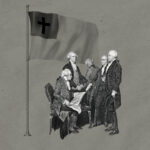The Story: A new survey claims that on two key doctrines, the majority of U.S. Protestants hold views that are more in line with the Roman Catholic Church than with the historical position of the Reformation. But is that true, or were respondents merely confused? [Note: This article has been significantly updated after several people pointed out that the questions asked by Pew Research Center do not really clarify the differences between Catholics and Protestants in the way in which I first understood their survey.]
The Background: According to a new survey by the Pew Research Center, 46 percent of U.S. Protestants agree that faith alone is needed to get into heaven while 52 percent say both good deeds and faith are needed to get into heaven. Originally, I had read that statement to mean that faith alone was needed for justification since that is the what seperates Catholics from Protestants, which was the point of Pew’s survey. Pew specifically identifies this as the sola fide (faith alone) position, which is indeed what Protestants believe about justification. However, as one theologian has pointed out to me, “We are justified by faith alone, with no works whatsoever as the necessary instrument. But we do not ‘get into heaven’ without the confirmation of that faith through good deeds, as many texts in the New Testament affirm, and which Protestants have historically believed.” (I agree with this point wholeheartedly, of course.)
Pew also attempted to gauge American’s position on sola scriptura—the traditional Protestant belief that the Bible is ultimately the sole source of religious authority for Christians. Only 46 percent of American Protestants say the Bible is the sole source of religious authority for Christians while 52 percent say that in addition to the Bible, Christians need guidance from church teachings and traditions.
Fully two-thirds of white evangelicals agree that faith alone is the key to getting into heaven, and nearly six in ten say the Bible is the only source to which Christians should look for religious guidance. Among white evangelicals, only 44 percent express both convictions—37 percent believe one but not the other, while 19 percent do not embrace either position.
(There is other data presented in this intriguing survey that is worthy of note. My TGC colleague Sarah Eekhoff Zylstra has a more in-depth examination of the survey’s findings in her article for Christianity Today.)
Why It Matters: In his letter to the Galatians the apostle Paul says, “We ourselves are Jews by birth and not Gentile sinners; yet we know that a person is not justified by works of the law but through faith in Jesus Christ, so we also have believed in Christ Jesus, in order to be justified by faith in Christ and not by works of the law, because by works of the law no one will be justified” (Gal. 2:15-16).
The belief we are justified (accounted as right before God) by faith and nothing else is the cornerstone of the Protestant Reformation. This doctrine, which we refer to as sola fide (by faith alone), is the key point of separation between Roman Catholic and Protestant theology. I agree with R.C. Sproul, who says:
The issue that divided the Roman Catholics from the Protestant Reformers was not a secondary or tertiary doctrine. The dispute focused on the essence of the gospel. Some have argued that sola fide (faith alone) is central to the Christian faith but not essential. I contend, however, that it is essential to the gospel in that, without sola fide, we do not have the gospel. And without the gospel, we have no salvation.
Because it is such an essential doctrine, to deny the truth of sola fide is to reject a cornerstone of the gospel and the only foundation for calling oneself a “Protestant.” But does this survey really find that Protestants reject sola fide, or merely that they were confused by what was being asked?
In the original version of this article I wrote, “As with any survey or poll, though, I recommend carefully examining the questions to see if it accurately reflects the findings.” Unfortunately, I didn’t follow that recommendation as closely as I should have. The Pew survey attempts to determine how Protestants and Catholics view sola fide and sola scriptura. But the questions they asked do not really determine this distinction. The specific question Pew asked for the sola fide question was, “Which statement comes closer to your view, even if neither is exactly right?” The choices of answers were: “Both good deeds and faith in God are necessary to get into heaven” and “Faith in God is the only thing that gets people into heaven.”
As noted above, this doesn’t really clarify the issue of justification since it asks what is needed to get into heaven, an issue of salvation. As Martin Luther himself said, “Works are necessary to salvation, but they do not cause salvation, because faith alone gives life.”
Similarly, the sola scriptura question is open to be interpreted (or misinterpreted) in various ways. For example, some respondents may think it implies a relativism of interpretation and is asking whether we need “religious guidance” in understanding the Bible’s meaning. Such potential confusions about what the question is asking lead me to be less concerned about this particular finding.
I apologize for the confusion I caused by my original comments on this survey. But I’m not sure my conclusion is necessarily different, since it may still show that many people hold a non-Protestant position.
For example, according to the survey 67 percent of white evangelicals say that faith in God alone is needed to get into heaven (when all evangelicals are included the number drops to 57 percent). However, that number increases to eight in ten for white evangelicals who say they attend church on a weekly basis, compared with 54 percent among evangelicals who attend church less regularly, and 72 percent for college-educated evangelicals, compared to 53 percent with less education. While it’s possible that evangelicals who have less education and go to church less frequently have a more orthodox view than those who go weekly and have more education, I think there is another explanation.
As I’ve mentioned before in previous articles on polls and surveys, the answers given by respondents tend to be affected by priming bias, in particular by semantic bias. This means that exposure to one word makes you more likely to assume other words are in the same conceptual category. For example, if I say the words “cat” and “cougar” and ask you to name an animal you may be primed to respond with the word “lion.”
Similarly, the types of questions that are asked tend to prime a respondent to assume later questions are of the same type. For example, this Pew survey also asks the following questions:
“Just in your own words, what does the term ‘Protestant’ mean?”
“When you think of Catholics and Protestants TODAY, are they religiously more similar than they are different, or are they religiously more different than they are similar?” [emphasis in original].
“As far as you know . . . What was the name of the person whose writings and actions inspired the Protestant Reformation?”
“Just in your own words, what is the most important way in which Catholics and Protestants today are religiously similar?”
“Just in your own words, what is the most important difference between Catholics and Protestants today?”
“And just in your own words, what do you think determines whether a person will gain eternal life?”
”As far as you know . . . Which of these religious groups traditionally teaches that salvation comes through faith alone?” [Only Protestants, only Catholics, both, neither]
This leads me to believe that many respondents were primed to be on guard to make a distinction between what Catholics believe and what Protestants believe. I believe this is true because, after having read the survey questions, I myself was looking for differences between Protestants and Catholics and assumed that when Pew described the question as being about sola fide I read the question as being about justification when what it really said was “get into heaven” (i.e., salvation). I was primed to follow Pew’s reasoning even though when I wrote this article I was explicitly on the lookout for the effects of priming on the survey results.
The conclusion I draw is that some people were reading the question as I did as being about jusification, while many others were seeing it as merely about salvation. What it makes clear is that a large group of evangelicals gave the wrong answer based on what they thought the question was asking. Unfortunately, it’s impossible to know based on these results how many people are actually “pseudo-Protestants” and how many are (like me) merely prone to reading too much into survey questions.
Download your free Christmas playlist by TGC editor Brett McCracken!
 It’s that time of year, when the world falls in love—with Christmas music! If you’re ready to immerse yourself in the sounds of the season, we’ve got a brand-new playlist for you. The Gospel Coalition’s free 2025 Christmas playlist is full of joyful, festive, and nostalgic songs to help you celebrate the sweetness of this sacred season.
It’s that time of year, when the world falls in love—with Christmas music! If you’re ready to immerse yourself in the sounds of the season, we’ve got a brand-new playlist for you. The Gospel Coalition’s free 2025 Christmas playlist is full of joyful, festive, and nostalgic songs to help you celebrate the sweetness of this sacred season.
The 75 songs on this playlist are all recordings from at least 20 years ago—most of them from further back in the 1950s and 1960s. Each song has been thoughtfully selected by TGC Arts & Culture Editor Brett McCracken to cultivate a fun but meaningful mix of vintage Christmas vibes.
To start listening to this free resource, simply click below to receive your link to the private playlist on Spotify or Apple Music.


































